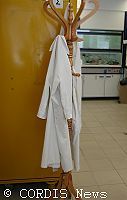Scientists worry that US science may be in danger of deteriorating
With US students less and less interested in studying for science and engineering degrees, the top US post-graduate schools have got used to turning increasingly towards Europe and Asia to fill their laboratories with the best students and scientists. However, a combination of Europe and Asia having recognised that scientific research and innovation are the fuel for a strong economy, and the US decision to apply strict visa restrictions on foreign students following the 11 September 2001 attacks, has left US scientists concerned that the fifty year brain gain in the US might be coming to an end. According to the National Science Foundation, the US share of worldwide scientific and engineering research publications, Nobel Prize awards, and some types of patents is falling. Furthermore, since 2002, US universities have experienced a 19 per cent drop in applications from foreign-students from 400,000 to 325,000 per year. On the other hand, the success of the Chinese government's 'Develop science to save the country' policy lead to Hong Kong University receiving twice as many applications from Chinese students in 2004 as it had done three years previously. According to the science advisor of former US President Bill Clinton, Neal Lane, the current administration's decision to limit the use of embryonic stem cells in research has harmed US scientists' ability to compete in the biomedical research field. 'The stem cell decision has certainly put us behind at the front end of the curve,' Mr Lane said. 'It's a huge barrier'. According to Albert Teich, director of science and policy programmes at the American Association for the Advancement of Science, another problem has been the reduction in federal funding for basic science research as the federal budget increasingly focuses on applied military security research. Although he agrees that US federal science spending is still far greater than in any other country, with the US spending one and a half times more on research and development (R&D) than the EU, Dr Teich insisted that 'it is probably wrong to say US science is currently in decline, but it is certainly in danger of declining. We're perched on the edge.' In July, a report by the National Foundation for American Policy (NFAP) warned that in order to retain its technological superiority, the US needed to encourage an open policy towards the immigration of professionals and students. The report also encouraged policymakers to consider ways to boost science and maths education within the US, and to provide incentives for businesses to invest in long-term R&D initiatives. Open labour markets, it stated, help to strengthen the US economy and provide the foundation for innovation in future generations. At a time when Silicon Valley is facing a labour shortage of skilled engineers and scientists, the need to embrace skilled immigrant IT (information technology) professionals is all the more pressing, the report insisted. 'Failure to understand these implications could result in a 'reverse brain drain', in which the US loses its best and brightest to nations in the developing world. If the rest of the world no longer views the US as the home of innovation and open markets, foreign-born Americans will move elsewhere,' concludes the report.
Countries
United States



